

Ethica Publishing Inc: Book Contents. Employee Monitoring with GPS David Meyers and David Patience Introduction____________________________________________________ Technology used to track employees has not only transformed the workplace environment, but has also raised many privacy and legal issues.
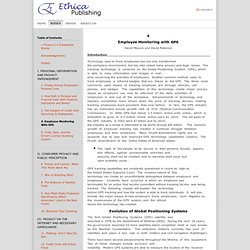
Ethica Publishing Inc: Book Contents. 0305. Kaplan_894_CH05. Google Maps: The perfect alibi? If you watch crime dramas on TV, you'll be familiar with one of the tools that the enterprising detectives usually use to track a suspect's past movements: The phone's GPS unit.
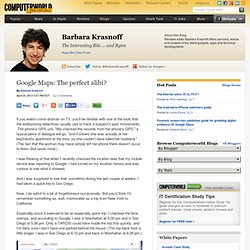
"We checked the records from her phone's GPS," a typical piece of dialogue will go, "and it shows she was actually at her boyfriend's apartment at the time, so she couldn't have killed her husband. " (The fact that the woman may have simply left her phone there doesn't occur to them. But never mind.) I was thinking of that when I recently checked the location data that my mobile device was reporting to Google. Police GPS Tracking ‘Bullets’ Lets Squad Cars Shoot Tracking Devices Onto Fleeing Vehicles [VIDEO] "If you had told me 16 years ago that I would have a cannon on the front of my car, I wouldn't have believed it,” Iowa state trooper Tim Sieleman told CBS News.
Officers control the GPS tracking bullets from inside the squad car. When the officer presses a button, the grill of the car opens, and the compressed gun fires a sticky GPS bullet directly in front of it. GPS monitoring of protection-order respondents at MENZ Issues. FYI, our letter to Hon Anne Tolley regarding her Radio NZ interview on 16 May 2013, that can be heard here.
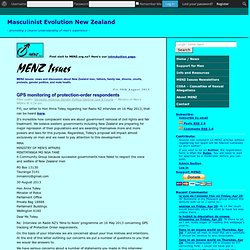
It’s incredible how complacent kiwis are about government removal of civil rights and fair treatment. "Emerging forms of covert surveillance using GPS-enabled devices" by Roba Abbas, Katina Michael et al. Abstract This paper presents the real possibility that commercial mobile tracking and monitoring solutions will become widely adopted for the practice of non-traditional covert surveillance within a community setting, resulting in community members engaging in the covert observation of family, friends, or acquaintances.

This paper investigates five stakeholder relationships using scenarios to demonstrate the potential socio-ethical implications that tracking and monitoring people will have on society at large. The five stakeholder types explored in this paper include: (i) husband-wife (partner-partner), (ii) parent-child, (iii) employer-employee, (iv) friend-friend, and (v) stranger-stranger. Mobile technologies such as mobile camera phones, global positioning system data loggers, spatial street databases, radio-frequency identification and other pervasive computing can be used to gather real-time, detailed evidence for or against a given position in a given context. GPS and Your Privacy. Kroll predicted the Global Positioning System (GPS) would become a hot topic this year in the realm of privacy.
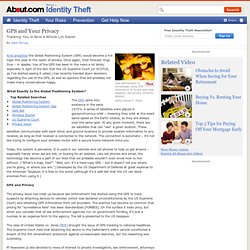
Once again, their forecast rings true – in spades. Use of the GPS has been in the news a lot lately, especially in light of the fact that the US Supreme Court (or SCOTUS, as I've started seeing it called,) has recently handed down decisions regarding the use of the GPS, as well as opinions that will probably not make many conservatives happy. What Exactly Is the Global Positioning System? Want security, privacy? Turn off that smartphone, tablet GPS. People with smartphones and tablets may be giving Apple and Android apps they download the permission to capture their geolocation data to know where they are, but security experts are making the strong argument to just say no instead -- and turn off that GPS function unless really needed.
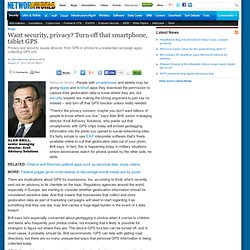
"There's the privacy concern, maybe you don't want billions of people to know where you live," says Alan Brill, senior managing director, Kroll Advisory Solutions, who points out that smartphones with GPS chips today will embed geotagging information into the photo you upload to social-networking sites. It's fairly simple to use EXIF interpreter software that's freely available online to cull that geolocation data out of your photo, Brill says. In fact, this is happening today in military situations where adversaries watch for photos posted by the other side, he adds. RELATED: Obama and Romney political apps suck up personal data, study claims. GPS Privacy Issues: Fears as police could track your GPS without a warrant. By Associated Press Updated: 09:48 GMT, 9 November 2011 The U.S.
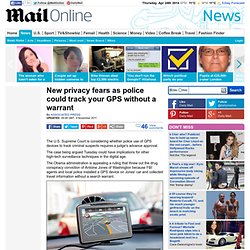
Supreme Court is considering whether police use of GPS devices to track criminal suspects requires a judge's advance approval. The case being argued Tuesday could have implications for other high-tech surveillance techniques in the digital age. The Obama administration is appealing a ruling that threw out the drug conspiracy conviction of Antoine Jones of Washington because FBI agents and local police installed a GPS device on Jones' car and collected travel information without a search warrant. Tracking: The case will determine whether or not it is fair and legal for police officers to use a suspect's GPS device without issuing a warrant. The emerging markets for GPS-enabled devices, and where opportunities lie in terms of device formats and vertical markets. London—Sept. 17, 2013—Despite the continued decline of personal navigation devices (PNDs), and the threat of smartphones, smart watches and eyewear, the portable GPS-enabled device market is forecast to continue to hold its own thanks to dedicated (head-up display) HUD/eyewear, cycling and health/tracking devices.
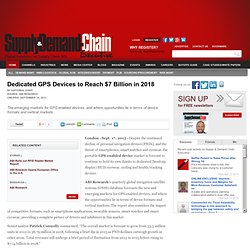
ABI Research’s quarterly global navigation satellite systems (GNSS) database forecasts the new and emerging markets for GPS-enabled devices, and where the opportunities lie in terms of device formats and vertical markets. The report also considers the impact of competitive formats, such as smartphone applications, wearable sensors, smart watches and smart eyewear, providing a complete picture of drivers and inhibitors in this market. Senior analyst Patrick Connolly commented, “The overall market is forecast to grow from 33.3 million units in 2012 to 36.79 million in 2018, following a brief dip in 2013 as PND declines outweigh growth in other areas.